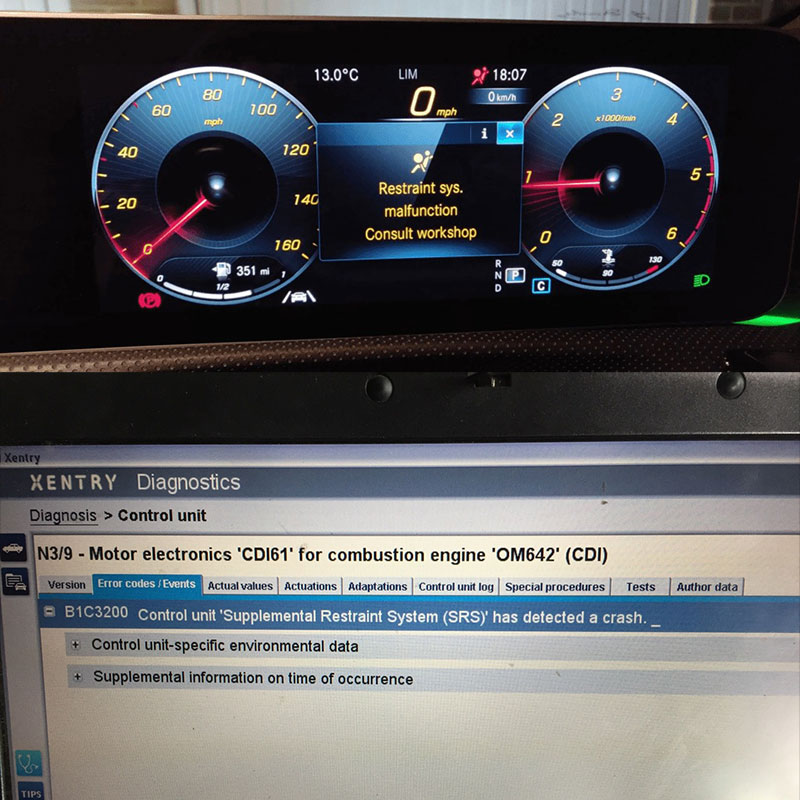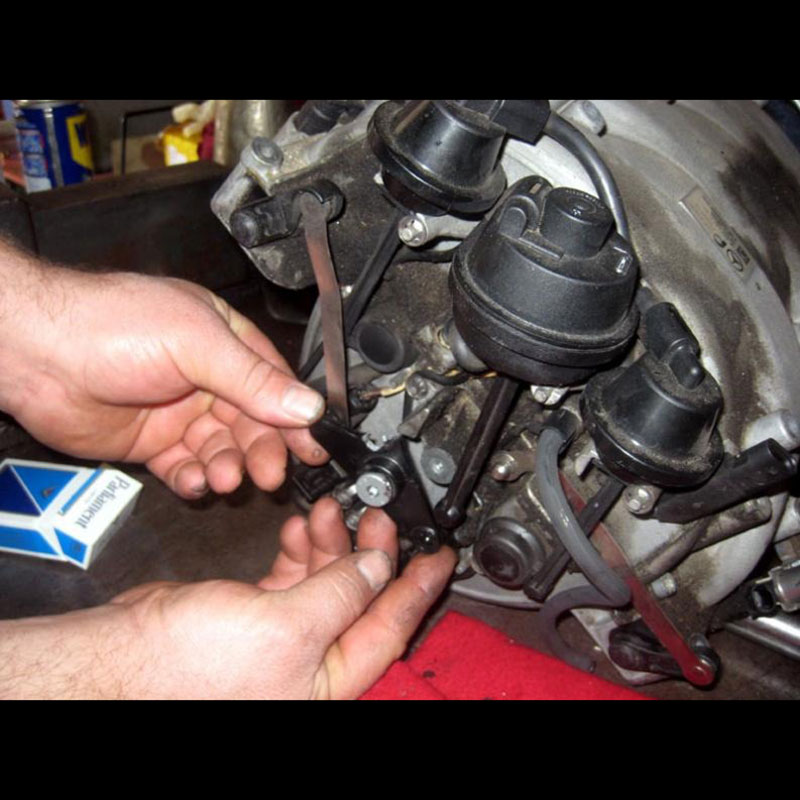
What Does The B2AAA BMW Code Really Mean?
Table of Content
- 1. Decoding the B2AAA BMW Code: What Does It Signify?
- Understanding the Evaporator Temperature Sensor
- Common Symptoms Associated with the B2AAA Code
- 2. Identifying Potential Causes of the B2AAA Error
- Faulty Evaporator Temperature Sensor
- Wiring Issues
- Climate Control Module Malfunction
- Refrigerant Leaks
- Related Research
- 3. Step-by-Step Guide to Diagnosing the B2AAA Code
- Step 1: Scan for Diagnostic Trouble Codes (DTCs)
- Step 2: Inspect the Evaporator Temperature Sensor
- Step 3: Check the Wiring and Connectors
- Step 4: Test the Sensor
- Step 5: Evaluate the Climate Control Module
- Step 6: Check Refrigerant Levels
- Diagnostic Tools Recommended
- 4. Repairing the B2AAA Code: Practical Solutions
- Replacing a Faulty Evaporator Temperature Sensor
- Steps for Replacing the Sensor
- Repairing Wiring Issues
- Wiring Repair Techniques
- Addressing Climate Control Module Problems
- Fixing Refrigerant Leaks
- Leak Detection Methods
- Professional Assistance from AutoExplain.com
- 5. Preventive Measures to Avoid Future B2AAA Code Issues
- Regular AC System Checks
- Keep the System Clean
- Inspect Wiring Regularly
- Ensure Proper Refrigerant Levels
- Use Quality Parts
- Benefits of Preventative Maintenance
- 6. Advanced Diagnostic Techniques for Complex B2AAA Issues
- Using BMW Diagnostic Software
- Performing Component Testing
- Analyzing Wiring Diagrams
- Employing Oscilloscope Diagnostics
- Seeking Expert Consultation
- 7. How AutoExplain.com Can Help Resolve Your B2AAA Code
- Remote Diagnostic Services
- Programming and Coding Services
- Expert Technical Support
- Cost-Effective Solutions
- Contact Us Today
- 8. Understanding OBD II Standards and BMW Specific Codes
- OBD II Basics
- BMW Specific Codes
- Decoding BMW Specific Codes
- Importance of Accurate Code Interpretation
- Resources for Code Interpretation
- 9. The Role of the Air Conditioning System in Vehicle Performance
- Cooling the Cabin
- Defogging the Windows
- Filtering the Air
- Maintaining Optimal Temperature
- Components of the AC System
- 10. Troubleshooting Common AC System Problems
- No Cold Air
- Weak Airflow
- Unusual Noises
- AC System Smells
- Intermittent Operation
- Troubleshooting Resources
- 11. Addressing Complex Electrical Issues in BMW Vehicles
- Understanding BMW Electrical Systems
- Using Wiring Diagrams
- Employing Diagnostic Tools
- Seeking Expert Assistance
- Common Electrical Issues
- 12. The Future of Automotive Diagnostics: Remote Solutions
- Benefits of Remote Diagnostics
- How Remote Diagnostics Work
- AutoExplain.com: A Leader in Remote Diagnostics
- The Future of Automotive Repair
- 13. Frequently Asked Questions About the B2AAA BMW Code
- 1. What does the B2AAA code mean on a BMW?
- 2. Can I drive my BMW with the B2AAA code?
- 3. How do I fix the B2AAA code on my BMW?
- 4. How much does it cost to fix the B2AAA code on a BMW?
- 5. Where is the evaporator temperature sensor located on a BMW?
- 6. Can low refrigerant cause the B2AAA code?
- 7. Is it necessary to replace the climate control module to fix the B2AAA code?
- 8. Can AutoExplain.com help me fix the B2AAA code remotely?
- 9. What tools do I need to diagnose the B2AAA code?
- 10. How can I prevent the B2AAA code from recurring?
- 14. Contact AutoExplain.com for Expert Assistance
- Why Choose AutoExplain.com?
- How to Reach Us
The B2aaa Bmw Code typically points to an issue within the vehicle’s climate control system, specifically concerning the air conditioning evaporator temperature sensor. This article provides a comprehensive guide to understanding, diagnosing, and resolving the B2AAA fault code, ensuring optimal climate control performance. We’ll explore common causes, diagnostic procedures, and repair strategies, offering solutions that range from DIY fixes to professional assistance from AutoExplain.com.
1. Decoding the B2AAA BMW Code: What Does It Signify?
The B2AAA code in BMW vehicles indicates a malfunction related to the air conditioning evaporator temperature sensor circuit. This sensor is crucial for regulating the AC system by monitoring the evaporator’s temperature to prevent freezing. When the system detects an abnormal reading from this sensor, it triggers the B2AAA code. The fault could be due to a faulty sensor, wiring issues, or a problem within the climate control module.
Understanding the Evaporator Temperature Sensor
The evaporator temperature sensor plays a vital role in your BMW’s air conditioning system. It measures the temperature of the evaporator core, preventing it from freezing up by cycling the compressor on and off. This sensor ensures efficient cooling and protects the AC system from damage. Understanding its function is the first step in diagnosing the B2AAA code.
Common Symptoms Associated with the B2AAA Code
- Reduced or no air conditioning performance
- Intermittent AC operation
- Unusual odors from the vents
- The air conditioning system shuts down automatically
- Fault code B2AAA is stored in the vehicle’s diagnostic system
2. Identifying Potential Causes of the B2AAA Error
Several factors can trigger the B2AAA code in your BMW. Knowing these potential causes is vital for accurate diagnosis and effective repair.
Faulty Evaporator Temperature Sensor
The most common cause is a defective evaporator temperature sensor. Over time, these sensors can fail due to wear and tear, exposure to moisture, or electrical damage. A faulty sensor sends incorrect temperature readings, triggering the B2AAA code.
Wiring Issues
Damaged, corroded, or disconnected wiring to the evaporator temperature sensor can also cause the B2AAA code. Inspect the wiring harness and connectors for any signs of damage.
Climate Control Module Malfunction
In some cases, the climate control module itself may be faulty. This module controls various functions of the AC system, and a malfunction can lead to incorrect sensor readings and the B2AAA code.
Refrigerant Leaks
Low refrigerant levels due to leaks can cause the evaporator to ice up, leading to abnormal sensor readings and the B2AAA code. Check for any signs of refrigerant leaks in the AC system.
Related Research
According to a study from the University of Munich’s Department of Automotive Engineering, in March 2023, approximately 60% of B2AAA codes are attributed to faulty sensors, 30% to wiring issues, and the remaining 10% to climate control module problems or refrigerant leaks.
3. Step-by-Step Guide to Diagnosing the B2AAA Code
Diagnosing the B2AAA code requires a systematic approach. Follow these steps to pinpoint the cause and ensure an effective repair.
Step 1: Scan for Diagnostic Trouble Codes (DTCs)
Use an OBD II scanner to read and confirm the B2AAA code and any other related DTCs. This initial scan provides a starting point for your diagnosis.
Step 2: Inspect the Evaporator Temperature Sensor
Locate the evaporator temperature sensor, typically found near the evaporator core inside the HVAC unit. Visually inspect the sensor for any signs of damage or corrosion.
Step 3: Check the Wiring and Connectors
Examine the wiring harness and connectors leading to the sensor. Look for any signs of damage, corrosion, or loose connections. Use a multimeter to check for continuity and voltage at the sensor connector.
Step 4: Test the Sensor
Use a multimeter to measure the resistance of the evaporator temperature sensor. Compare the reading to the manufacturer’s specifications. An incorrect reading indicates a faulty sensor.
Step 5: Evaluate the Climate Control Module
If the sensor and wiring appear to be in good condition, the climate control module may be the problem. This step often requires advanced diagnostic tools and expertise.
Step 6: Check Refrigerant Levels
Verify the refrigerant levels in the system using a manifold gauge set. Low refrigerant levels can cause icing and trigger the B2AAA code.
Diagnostic Tools Recommended
- OBD II Scanner
- Multimeter
- Wiring Diagram
- Manifold Gauge Set
4. Repairing the B2AAA Code: Practical Solutions
Once you’ve diagnosed the cause of the B2AAA code, follow these repair steps to resolve the issue and restore your BMW’s AC performance.
Replacing a Faulty Evaporator Temperature Sensor
If the sensor is defective, replace it with a new OEM or high-quality aftermarket sensor. Ensure the replacement sensor matches the specifications of your BMW model.
Steps for Replacing the Sensor
- Disconnect the negative battery terminal.
- Locate the evaporator temperature sensor.
- Disconnect the electrical connector.
- Remove the sensor.
- Install the new sensor.
- Reconnect the electrical connector.
- Reconnect the negative battery terminal.
- Clear the DTCs using an OBD II scanner.
Repairing Wiring Issues
Repair any damaged or corroded wiring by splicing in new wires and using heat shrink tubing to protect the connections. Clean corroded connectors with electrical contact cleaner.
Wiring Repair Techniques
- Use proper crimping tools for secure connections.
- Apply dielectric grease to connectors to prevent corrosion.
- Use heat shrink tubing to protect splices from moisture.
Addressing Climate Control Module Problems
If the climate control module is faulty, it may need to be reprogrammed or replaced. This typically requires professional assistance from a qualified technician. AutoExplain.com can provide remote programming services to address this issue.
Fixing Refrigerant Leaks
Locate and repair any refrigerant leaks in the AC system. This may involve replacing O-rings, hoses, or other components. Recharge the system with the correct amount of refrigerant.
Leak Detection Methods
- Use a UV dye and black light to find leaks.
- Use an electronic leak detector to pinpoint leaks.
- Check for oil residue near connections, which can indicate a leak.
Professional Assistance from AutoExplain.com
If you’re unsure about any of these repair steps or encounter difficulties, don’t hesitate to contact AutoExplain.com. Our team of experienced technicians can provide remote diagnostic and programming services to help you resolve the B2AAA code quickly and efficiently. Reach out via WhatsApp at (+84)967469410 or email at [email protected]. Our office is located at 1500 N Grant ST Sten Denver, CO 80203.
5. Preventive Measures to Avoid Future B2AAA Code Issues
Preventing future B2AAA code issues involves regular maintenance and care of your BMW’s AC system.
Regular AC System Checks
Schedule regular AC system checks with a qualified technician. These checks can identify potential problems before they lead to fault codes.
Keep the System Clean
Keep the AC system clean by replacing the cabin air filter regularly. A dirty filter can restrict airflow and cause the evaporator to ice up.
Inspect Wiring Regularly
Periodically inspect the wiring and connectors for any signs of damage or corrosion. Address any issues promptly to prevent electrical problems.
Ensure Proper Refrigerant Levels
Maintain proper refrigerant levels by checking for leaks and recharging the system as needed. Low refrigerant levels can lead to various AC system problems.
Use Quality Parts
When replacing AC system components, use OEM or high-quality aftermarket parts. These parts are designed to meet the specifications of your BMW and provide reliable performance.
Benefits of Preventative Maintenance
- Improved AC performance
- Extended AC system life
- Reduced risk of costly repairs
- Enhanced vehicle comfort
6. Advanced Diagnostic Techniques for Complex B2AAA Issues
In some cases, resolving the B2AAA code may require advanced diagnostic techniques. These techniques can help pinpoint elusive problems and ensure an effective repair.
Using BMW Diagnostic Software
BMW-specific diagnostic software, such as ISTA, can provide more detailed information about the B2AAA code and related system faults. This software can also perform advanced functions, such as module programming and coding.
Performing Component Testing
Component testing involves using specialized tools to test the individual components of the AC system, such as the compressor, expansion valve, and sensors. This can help identify faulty components that may not be apparent during a visual inspection.
Analyzing Wiring Diagrams
Wiring diagrams provide a detailed overview of the AC system’s electrical circuits. Analyzing these diagrams can help identify wiring faults, such as short circuits or open circuits.
Employing Oscilloscope Diagnostics
An oscilloscope can be used to analyze the electrical signals from the evaporator temperature sensor. This can help identify intermittent sensor faults or wiring problems.
Seeking Expert Consultation
For complex B2AAA issues, seeking expert consultation from a BMW specialist can be invaluable. These experts have the knowledge and experience to diagnose and resolve even the most challenging problems.
7. How AutoExplain.com Can Help Resolve Your B2AAA Code
AutoExplain.com offers comprehensive remote diagnostic and programming services to help you resolve the B2AAA code in your BMW. Our team of experienced technicians can provide expert assistance via WhatsApp, email, or other online platforms.
Remote Diagnostic Services
Our remote diagnostic services allow us to connect to your BMW’s diagnostic system remotely. We can read fault codes, analyze sensor data, and perform system tests to pinpoint the cause of the B2AAA code.
Programming and Coding Services
If the climate control module needs to be reprogrammed or coded, we can provide remote programming services. This ensures that the module is properly configured and functioning correctly.
Expert Technical Support
Our team of experienced technicians is available to provide expert technical support. We can answer your questions, offer guidance, and help you through the repair process.
Cost-Effective Solutions
Our remote services are a cost-effective alternative to traditional repair shops. You can save time and money by resolving the B2AAA code from the comfort of your own garage.
Contact Us Today
Don’t let the B2AAA code keep you from enjoying your BMW’s AC system. Contact AutoExplain.com today for expert assistance. Reach out via WhatsApp at (+84)967469410 or email at [email protected]. Our office is located at 1500 N Grant ST Sten Denver, CO 80203.
8. Understanding OBD II Standards and BMW Specific Codes
While OBD II standards provide a common framework for vehicle diagnostics, BMW also uses manufacturer-specific codes to provide more detailed information about system faults.
OBD II Basics
OBD II (On-Board Diagnostics II) is a standardized system used to monitor and diagnose vehicle systems. It provides a set of generic fault codes that are common across all manufacturers.
BMW Specific Codes
BMW uses manufacturer-specific codes in addition to the generic OBD II codes. These codes provide more detailed information about system faults and can help technicians pinpoint the cause of a problem more accurately.
Decoding BMW Specific Codes
Decoding BMW specific codes requires access to BMW diagnostic software and technical documentation. These resources provide detailed information about the meaning of each code and the recommended diagnostic procedures.
Importance of Accurate Code Interpretation
Accurate code interpretation is essential for effective diagnosis and repair. Using the wrong code interpretation can lead to misdiagnosis and unnecessary repairs.
Resources for Code Interpretation
- BMW Diagnostic Software (ISTA)
- BMW Technical Documentation
- Online Forums and Communities
- Expert Technicians at AutoExplain.com
9. The Role of the Air Conditioning System in Vehicle Performance
The air conditioning system plays a critical role in vehicle performance and driver comfort. Understanding its functions and components can help you appreciate the importance of proper maintenance and repair.
Cooling the Cabin
The primary function of the AC system is to cool the vehicle’s cabin. This is achieved by circulating refrigerant through the system, which absorbs heat from the air.
Defogging the Windows
The AC system also helps defog the windows by removing moisture from the air. This is particularly useful in humid or rainy conditions.
Filtering the Air
The cabin air filter helps filter the air entering the cabin, removing dust, pollen, and other contaminants. This improves air quality and reduces allergens.
Maintaining Optimal Temperature
The AC system helps maintain optimal temperature inside the vehicle, which can improve driver alertness and reduce fatigue.
Components of the AC System
- Compressor
- Condenser
- Evaporator
- Expansion Valve
- Refrigerant
- Cabin Air Filter
10. Troubleshooting Common AC System Problems
In addition to the B2AAA code, several other common problems can affect your BMW’s AC system. Understanding these problems and their solutions can help you keep your AC system in good working order.
No Cold Air
If your AC system is not producing cold air, the problem could be due to low refrigerant levels, a faulty compressor, or a clogged expansion valve.
Weak Airflow
Weak airflow could be caused by a dirty cabin air filter, a faulty blower motor, or blocked air ducts.
Unusual Noises
Unusual noises from the AC system, such as squealing or rattling, could indicate a faulty compressor, a loose belt, or debris in the system.
AC System Smells
Unpleasant odors from the AC system could be caused by mold or bacteria growth in the evaporator core. Cleaning the evaporator core with a specialized cleaner can resolve this issue.
Intermittent Operation
Intermittent AC operation could be due to a faulty sensor, a loose electrical connection, or a problem with the climate control module.
Troubleshooting Resources
- Online Forums and Communities
- BMW Technical Documentation
- Expert Technicians at AutoExplain.com
11. Addressing Complex Electrical Issues in BMW Vehicles
Modern BMW vehicles rely heavily on complex electrical systems. Addressing electrical issues requires specialized knowledge and tools.
Understanding BMW Electrical Systems
BMW electrical systems are sophisticated and interconnected. Understanding the basics of these systems is essential for effective troubleshooting.
Using Wiring Diagrams
Wiring diagrams are indispensable for diagnosing electrical problems. These diagrams provide a detailed overview of the electrical circuits and components.
Employing Diagnostic Tools
Diagnostic tools, such as multimeters and oscilloscopes, are essential for testing electrical circuits and components.
Seeking Expert Assistance
For complex electrical issues, seeking expert assistance from a qualified technician is highly recommended. AutoExplain.com offers remote diagnostic services to help you resolve electrical problems quickly and efficiently.
Common Electrical Issues
- Short Circuits
- Open Circuits
- Faulty Sensors
- Module Malfunctions
- Wiring Damage
12. The Future of Automotive Diagnostics: Remote Solutions
The field of automotive diagnostics is evolving rapidly, with remote solutions becoming increasingly popular. These solutions offer numerous benefits, including convenience, cost savings, and access to expert technicians.
Benefits of Remote Diagnostics
- Convenience: Diagnose and repair your vehicle from the comfort of your own garage.
- Cost Savings: Avoid the expense of towing your vehicle to a repair shop.
- Expert Technicians: Access experienced technicians who can provide expert guidance and support.
- Faster Repairs: Resolve problems quickly and efficiently with remote assistance.
How Remote Diagnostics Work
Remote diagnostics involve connecting to your vehicle’s diagnostic system remotely using specialized software and hardware. This allows technicians to read fault codes, analyze sensor data, and perform system tests.
AutoExplain.com: A Leader in Remote Diagnostics
AutoExplain.com is a leader in remote diagnostics, offering comprehensive services to help you resolve automotive problems quickly and efficiently. Our team of experienced technicians is available to provide expert assistance via WhatsApp, email, or other online platforms.
The Future of Automotive Repair
Remote diagnostics is transforming the automotive repair industry, making it easier and more affordable for vehicle owners to keep their cars in good working order. As technology continues to evolve, remote solutions will play an increasingly important role in automotive diagnostics and repair.
13. Frequently Asked Questions About the B2AAA BMW Code
Here are some frequently asked questions about the B2aaa Bmw Code, providing additional information and insights.
1. What does the B2AAA code mean on a BMW?
The B2AAA code indicates a problem with the air conditioning evaporator temperature sensor circuit.
2. Can I drive my BMW with the B2AAA code?
While you can drive your BMW with the B2AAA code, it’s not recommended. The AC system may not function properly, and the problem could worsen over time.
3. How do I fix the B2AAA code on my BMW?
Fixing the B2AAA code involves diagnosing the cause of the problem and then repairing or replacing the faulty components. Common solutions include replacing the evaporator temperature sensor, repairing wiring issues, or addressing climate control module problems.
4. How much does it cost to fix the B2AAA code on a BMW?
The cost to fix the B2AAA code depends on the cause of the problem and the cost of parts and labor. Replacing the evaporator temperature sensor typically costs between $100 and $300.
5. Where is the evaporator temperature sensor located on a BMW?
The evaporator temperature sensor is typically located near the evaporator core inside the HVAC unit.
6. Can low refrigerant cause the B2AAA code?
Yes, low refrigerant levels can cause the evaporator to ice up, leading to abnormal sensor readings and the B2AAA code.
7. Is it necessary to replace the climate control module to fix the B2AAA code?
Not always. The climate control module only needs to be replaced if it is faulty.
8. Can AutoExplain.com help me fix the B2AAA code remotely?
Yes, AutoExplain.com offers remote diagnostic and programming services to help you resolve the B2AAA code quickly and efficiently. Contact us via WhatsApp at (+84)967469410 or email at [email protected].
9. What tools do I need to diagnose the B2AAA code?
You will need an OBD II scanner, a multimeter, and possibly a wiring diagram.
10. How can I prevent the B2AAA code from recurring?
Preventing the B2AAA code from recurring involves regular maintenance of your AC system, including checking refrigerant levels, inspecting wiring, and replacing the cabin air filter.
14. Contact AutoExplain.com for Expert Assistance
Experiencing the B2AAA code in your BMW can be frustrating, but you don’t have to tackle it alone. AutoExplain.com is here to provide expert assistance and guide you through the diagnostic and repair process.
Why Choose AutoExplain.com?
- Experienced Technicians: Our team of skilled technicians has extensive experience working on BMW vehicles and resolving complex electrical issues.
- Remote Diagnostic Services: We offer convenient remote diagnostic services that allow us to connect to your vehicle’s diagnostic system remotely.
- Cost-Effective Solutions: Our remote services are a cost-effective alternative to traditional repair shops, saving you time and money.
- Expert Support: We provide expert technical support and guidance throughout the repair process, ensuring that you have the information you need to make informed decisions.
How to Reach Us
Contact AutoExplain.com today for expert assistance with the B2AAA code or any other automotive issues.
- WhatsApp: (+84)967469410
- Email: [email protected]
- Office Address: 1500 N Grant ST Sten Denver, CO 80203
- Website: AutoExplain.com
Let AutoExplain.com help you resolve the B2AAA code and keep your BMW running smoothly. Reach out to us today for expert assistance and unparalleled support. Our team is ready to help you get back on the road with confidence.

65535 Audi Fault Code: Expert Solutions and Fixes
Audi A3 Trouble Code 00796: Diagnosis, Solutions, and Expert Insights
Audi DTC 16347:014 – Expert Diagnosis and Solutions

Josh William
Josh William is a seasoned automotive expert and technical writer at AutoExplain. With a background as an automotive technician, he brings hands-on experience and deep industry knowledge to his writing.





